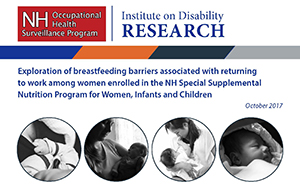NH Occupational Health Surveillance Program Releases Report on Barriers to Breastfeeding (NH UCEDD/LEND)
December 20, 2017

|
In New Hampshire 8 out of every 10 mothers initiates breastfeeding after birth, however only 3 mothers continue breastfeeding the full 12 months as suggested by the American Academy of Pediatrics. This and other findings are highlighted in a new report from the New Hampshire Occupational Health Surveillance Project (NH OHSP).
The new report, Exploration of breastfeeding barriers associated with returning to work among women enrolled in the NH Special Supplemental Nutrition Program for Women, Infants and Children, aims to better understand the barriers to women breastfeeding after childbirth, particularly focused on workplace accommodation policies and support practices that encourage or discourage breastfeeding after returning to work.
Major findings from the report include:
- Women who are currently on maternity leave were more likely to report that they were currently breastfeeding (56%). Women who are working full time (15%), and women who are unemployed but looking for work (12%) were least likely to be currently breastfeeding.
- "I went back to work" was reported the most by women working in the Accommodation Food and Hospitality industry group as the reason they stopped breastfeeding (33%).
- Women in every industry group reported they would have continued breastfeeding longer if it was easier to pump at work, with Health Care (39%), Manufacturing (58%), and Social Assistance Services (56%) being the top three industry groups represented.
"Our findings indicate that there is much room for improvement in developing supports for breastfeeding moms who work, particularly in low-income, part time, and service oriented industry groups," explains Dr. Karla Armenti, Director of NH OHSP. "These results also provide a better understanding of where efforts could be made to increase prevalence of continuing to breastfeed after returning to work." Results will be used to inform statewide initiatives for workplace breastfeeding support as well as future legislative efforts to expand protections for breastfeeding employees in the workplace."
The New Hampshire Occupational Health Surveillance Project provides meaningful statistics to identify priority occupational safety and health issues in the state. This includes reports on a variety of core occupational health indicators based on measures of health (work-related disease, injury, or disability) or factors associated with health, such as workplace exposures, hazards or interventions. It is a project at the Institute on Disability at the University of New Hampshire. For more information visit: www.nhohsp.unh.edu.
The Institute on Disability (IOD) at the University of New Hampshire was established in 1987 to provide a university-based focus for the improvement of knowledge, policies, and practices related to the lives of persons with disabilities and their families. Its mission is to promote full access, equal opportunities, and participation for all persons by strengthening communities and advancing policy and systems change, promising practices, education, and research.







